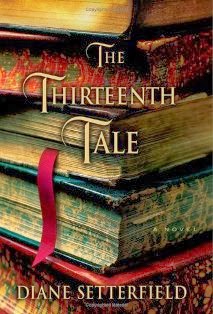 Thanks to everyone who participated in our virtual book club (which I introduced here). January’s selection was The Thirteenth Tale by Diane Setterfield.
Thanks to everyone who participated in our virtual book club (which I introduced here). January’s selection was The Thirteenth Tale by Diane Setterfield.
Here’s how it works: I’m going to throw out some discussion topics, and you can feel free to post your comments—about these topics or other things you want to talk about.
Discussion #1: Story vs. Truth
The initial letter Vida Winter sends to Margaret includes an interesting commentary about the power of story compared to the power of truth:
My gripe is not with lovers of the truth but with truth herself. What succor, what consolation is there in truth, compared to a story? What good is truth, at midnight, in the dark, when the wind is roaring like a bear in the chimney?…When fear and cold make a statue of you in your bed, don’t expect hard-boned and fleshless truth to come running to your aid. What you need are the plump comforts of a story. The soothing, rocking safety of a lie. (p. 5)
Meanwhile, Margaret agrees to be Vida Winter’s biographer only on the condition that Vida Winter tells her the truth. She even manages to squeeze a few verifiable facts out of the writer before she begins.
Over the course of the book, do you think Vida Winter’s stance on truth and story changes? Clearly, at the end of her life, the “plump comforts of a story” aren’t enough to soothe her. And Margaret seems to so lose herself in Vida Winter’s story that she no longer seems quite so consumed with the facts.
Which do you prefer: a story or the truth?
Discussion #2: Twins
One of the central themes of the book is twins. Vida Winter is haunted by twins who kept her outside their circle; Margaret is haunted by her twin who died as an infant—the sister whose absence still gapes.
Do you think there’s a special twin connection?
Discussion #3: Margaret
What do you think of Margaret as a character? Is her story compelling, or is she just a vehicle for Vida Winter to tell her story?
I enjoyed having two stories—the parallels between Margaret’s and Vida’s lives add depth and mystery to the book. But I wished I could have gotten more about Margaret’s story. When Margaret protests that she doesn’t have a story, Vida Winter tells her, “Of course you have. Everybody has a story.” But while we get glimmers of Margaret’s story, it feels flat in the shadow of Vida’s narrative.
In an interview shortly after the book’s release, Diane Setterfield shared this comment about the early process of writing The Thirteenth Tale: “The biographer, Margaret, was very quiet and reserved and she was very difficult and withdrawn, I could tell she was hiding something from me, but I couldn’t tell what it was. I got very annoyed with the book and the characters, and didn’t do anything for a year. After that I took a deep breath and sat down with it again. I couldn’t leave it alone—I just felt these characters deserved to have their stories told.”
What do you think? Did she do justice to Margaret’s character?
Discussion #4: One Lingering Mystery
In a book full of twists and turns, we uncover yet another surprise when Emmeline’s identity is called into question near the end of the book. Vida Winter recounts the scene after she saved Emmeline from the fire:
I look at her face and cannot find my beloved in it.
“Emmeline?” I whisper. “Emmeline?”
She does not reply.
I feel my heart die. What have I done? Have I…? Is it possible that…?
I cannot bear to know.
I cannot bear not to know. (p. 379)
And so Vida Winter cares for her half-sister for the rest of her life, not knowing if it’s her beloved Emmeline or the deranged Adeline. What do you think? Was it Emmeline or Adeline? And what would it say about Vida Winter if it was the latter?
Wrap-Up
For more about the author, you can visit this page. I was astonished to find that this was Diane Setterfield’s first novel—her previous publications were all academic works about nineteenth and twentieth century French literature. Not bad for her first try.
I’d give this book four stars for its engaging characters, the intriguing plotline, and the value it places on books and book lovers everywhere.
Rating: ★ ★ ★ ★
How many stars would you give this book?
{Reminder: I will give away a free book to one randomly selected commenter!}


